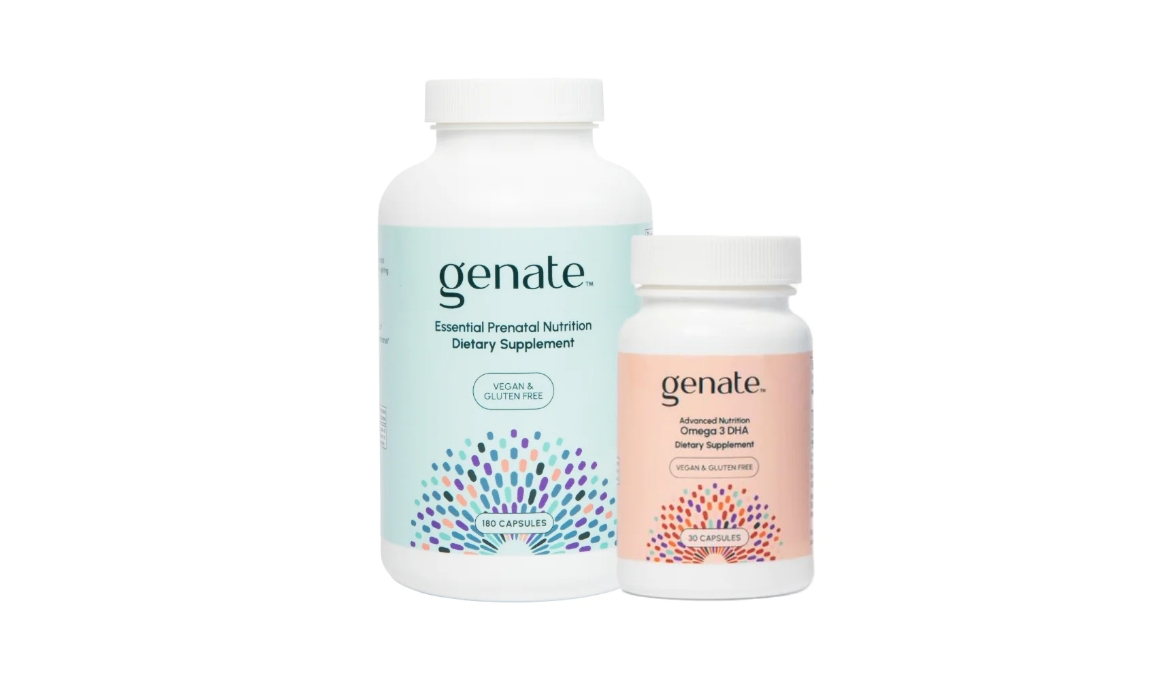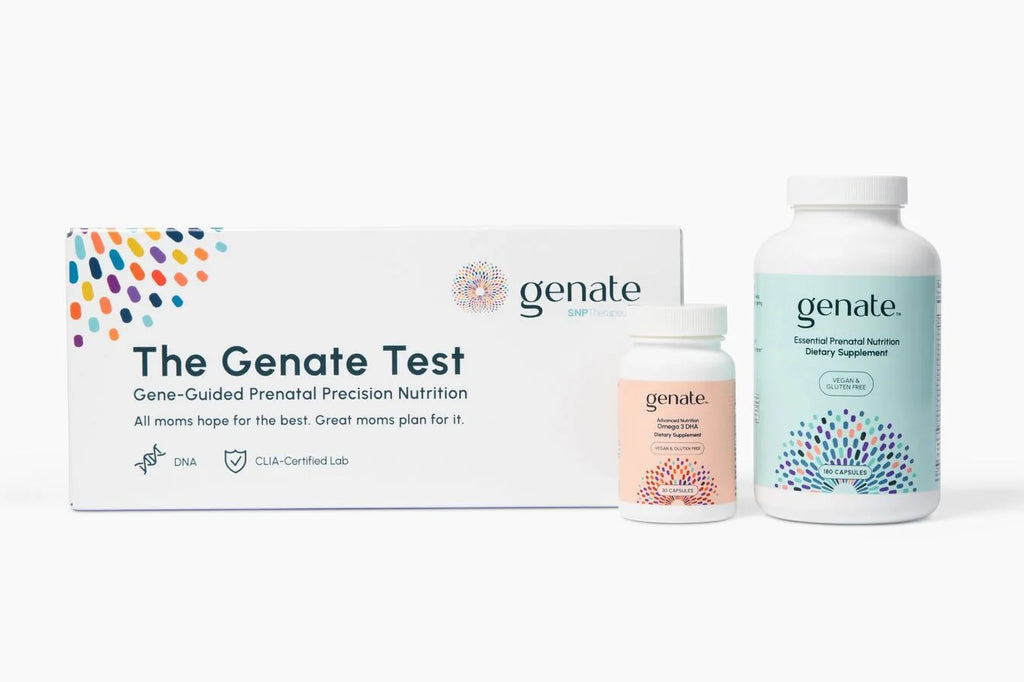Good nutrition is essential for every stage of your baby’s growth and development. But the efficiency with which your body metabolizes nutrients is partly determined by your genes, and common genetic variants can affect the metabolism of one-carbon nutrients that are critical for the development of your child’s brain and spinal cord. Genate Essential Prenatal Nutrition is a multivitamin formulated from academic research that provides women with a formulation optimized to support their baby’s cognitive development. It includes the one-carbon nutrients choline, betaine, methylfolate, and B vitamins that many women have trouble metabolizing and/or don’t get enough of in their diet.

MISCELLANEOUS
What to Pack in Your Hospital Bag for Labor
by Jordan Stachel, RDN • Medically Reviewed by Cara Everett, MS, RDN, LDN • December 8, 2023 • 10-15 minute read
Packing your hospital bag is exciting—it marks the home stretch before you get to meet your new little one. You may be wondering what to bring with you and what to leave at home. Read this article for everything you need to know.
When Should You Pack Your Labor Bag?
Many women wonder when they should start organizing their hospital bag. While there is some flexibility as to when you should get the hospital bag ready, it’s a good idea to think about your individual needs. For example, if you have a higher-risk pregnancy and/or risk factors for preterm labor, having a bag packed sooner is a good idea. (1)
Generally, it is a good idea to begin packing your hospital bag around 35-38 weeks in advance. Many women wonder if it’s fine to wait until the last week of pregnancy. While this is a personal decision, getting your bag packed a few weeks prior can give you one less thing to worry about.
The end of pregnancy is sometimes unpredictable, and packing a bag beforehand is one area that you have control over.
What to Pack in Mom’s Hospital Bag
While there are many things to consider packing in a mom’s hospital bag, these are the items that many deem essential:
- Form of ID: A photo ID, insurance forms, or other administrative paperwork
- Eyeglasses: Both glasses and/or contacts for several days
- Cell phone charger: With a USB converter, just in case. (We recommend bringing an extra-long phone cord since your outlet might be far from your bed.)
- Comfortable, loose clothing: Two or three outfits (including non-skid socks) that are easy to wear and to change into
- Bras: Nursing, sports, or other bras of choice
- Toiletries: Toothbrush, toothpaste, deodorant, lip balm, hairbrush
What to Pack in Baby’s Hospital Bag
Once you’ve packed your things, think about what your newborn will need. Some important items include:
- A going-home outfit
- Outfits to sleep in
- Blankets
- Bottles and/or a breast pump: Some hospitals may provide these items, but check ahead of time so you know if you should bring your own.
- A rear-facing car seat: While this is not technically “in the bag,” try to install your baby’s car seat before your due date.
What to Pack in Your Partner’s Hospital Bag
While most of the focus during childbirth is on the mother and baby, it’s important for partners to also be prepared. Things spouses or partners should include in their hospital bag include:
- Extra money: If you need to pay for parking or grab a quick snack from a vending machine, having some extra cash and/or change on hand can be helpful.
- Extra phone charger
- Camera or recording device
- Toiletries
- Change of clothes
- Snacks and drinks that you and your partner enjoy
- Book or magazine
- Speaker for playing relaxing music
- Extra glasses or contacts
- Your own pillow and blanket
What Not to Include in Your Hospital Bag
Once you have a handle on what to include in your, your baby’s, and your partner’s hospital bags, it can also be helpful to understand what not to bring with you. Try to leave these items at home:
- Expensive jewelry
- Valuables
- Too many changes of clothes
- A stash of diapers (the hospital will provide diapers)
The Bottom Line
This article is not intended as medical advice to treat or diagnose any health condition but rather as educational health information for the general public. It should not be used as a substitute for individualized medical care from your healthcare provider.
Shop the Article
Save 23% today!
Genate Essential Prenatal Multivitamin + Advanced Omega-3 DHA Package
Bundle to increase savings and provide the foundational nutrients needed for optimal health and development.
From $72 per month
Save 23% today!
Comprehensive Prenatal Support Package
Genate Essential Prenatal Multivitamin + Advanced Omega-3 DHA + Phosphatidylcholine
Our most comprehensive bundle - you’ll receive our Essential Prenatal Multivitamin, Advanced Phosphatidylcholine, and Advanced Omega-3 DHA.
From $110 per month
Save 30% today!
Comprehensive Prenatal Nutrition Bundle
Buy the Genate Test and a nutrition counseling session with a Genate registered dietitian, and receive a 30-day supply of the Genate Essential Prenatal Multivitamin FREE. Purchase includes a 90-day prenatal multivitamin subscription at our best monthly price.
$309

Jordan Stachel, RDN
Jordan is an RDN who holds a Master’s degree in Dietetics from The University of Southern California. She has many years of experience helping clients reach their health goals through her clinical work within private practice. It can be difficult for individuals to discern nutrition information that is both credible and relevant from misinformation and conflicting guidance.
As an expert in the field, Jordan finds great fulfillment in filling this gap by providing detailed clarification and explanation and leading the discussion surrounding nutrition and wellness. Jordan looks forward to continuing to help others achieve the most optimal version of themselves and improve their longevity as well as to be a dependable source and voice within the field of nutrition and dietetics.
References
- What are the risk factors for preterm labor and birth? National Institutes of Health. https://www.nichd.nih.gov/health/topics/preterm/conditioninfo/who_risk Updated May 9, 2023. Accessed October 15, 2023.
Take the Genate Quiz
Take our Nutrition Quiz to learn more about your nutrition journey.
Read Our Latest Articles
Frequently Asked Questions
What are the benefits of my baby getting the proper nutrients?
What are one-carbon nutrients and fatty acids, and why are they important?
One-carbon nutrients and fatty acids are critical for brain and spinal cord development during pregnancy and through the first two years of life. Although all nutrients are important, the one-carbon nutrients choline, folate, betaine, and B vitamins, along with the omega-3 fat DHA, provide the building blocks for proper growth of your developing baby's brain. Research at Cornell and Harvard universities has shown cognitive benefits for children born to mothers who received increased levels of one-carbon nutrients during pregnancy, demonstrating that optimal nutrition during pregnancy can have lasting effects for your baby.
If I buy Genate nutrition supplements, do I still need to take the test?
Genetic testing is a personal choice, and only you can decide what’s best for you and your baby. But the Genate Test is a powerful tool for optimizing your nutrition status, as it identifies genetically-caused metabolic inefficiencies that may influence your body’ ability to make and use the nutrients critical for your baby’s cognitive development. If you have SNPs in any of the nutrient pathways tested, your Genate Report will provide personalized recommendations for optimizing your nutrition. Our registered dietitians can show you how to fill in the gaps with foods and supplementation, if needed, to make sure you’re getting the nutrition you and your baby need.








